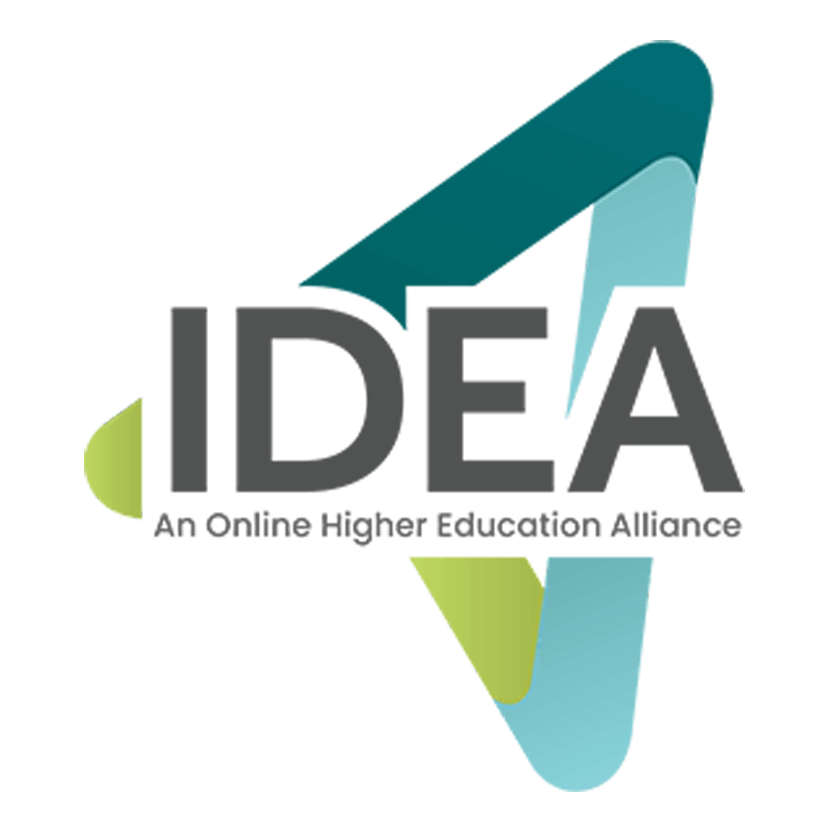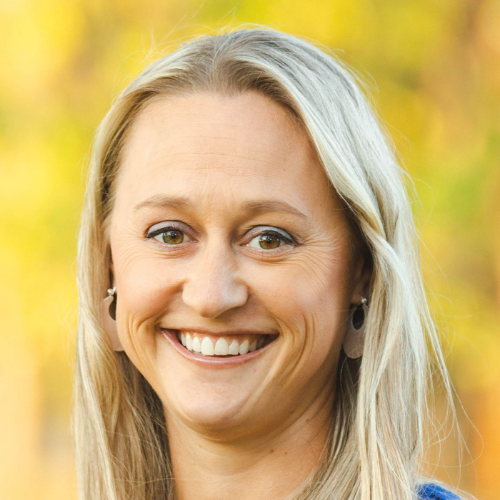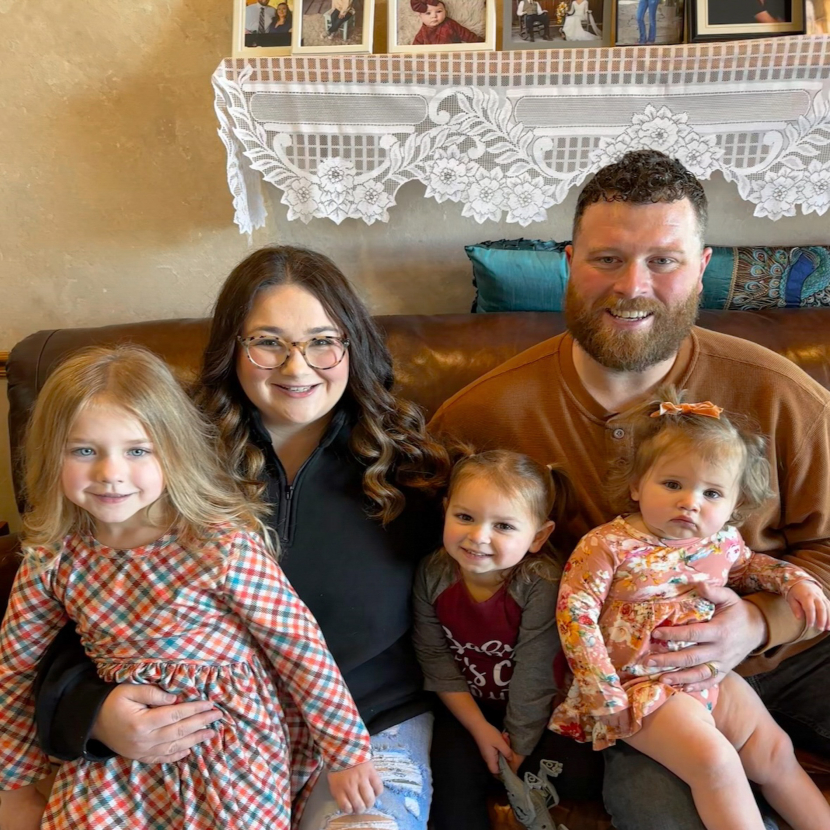Why Study Community Development through IDEA?
It is an ideal program if you:
- Enjoy working with others to find solutions to local or regional problems
- Are passionate about working in urban neighborhoods, rural areas, or tribal communities
- Seek to better understand how global issues are tied to specific places
- Volunteer in communities and want to be even more effective
- Desire to lead change that improves the quality of life in communities
- Work with communities and want to enhance your skills, knowledge, and credentials by earning a graduate degree or certificate
Hear from Morgan Holloman, a community development master's student, as she explains how the flexibility in this program allows her to complete coursework when it's convenient for her.
Program Formats in Community Development
IDEA offers both an online master's degree and a graduate certificate in community development, allowing you to select the best-fit academic path to meet your goals and advance your career.
Our programs are based on the professional standards established by the International Association for Community Development (IACD), Community Development Society (CDS), and National Association of Community Development Extension Professionals (NACDEP) - organizations that ensure the community development field is continuously innovating and improving to better meet the needs of those served.
Degree and certificate titles vary by member university; you can contact your home university directly for more information on how the title will appear on your diploma or certificate upon completion of the program. Review the official master's degree names at our member institutions in the Community Development Student Handbook.
There is no GRE requirement for application to this program.
Community Development Student Handbook
The online master's degree in community development consists of a 36-credit-hour curriculum that can be completed in as little as 24 months and focuses on refining your leadership ability and hands-on skills needed to help communities and regions build their own capacity for an inclusive, sustainable future. The interdisciplinary curriculum sits at the intersection of economic, political, legal, and social systems and has a firm foundation in six core courses that include:
- Foundations of Community Development
- Principles and Strategies of Community Change
- Organizing for Community Change
- Community Analysis (Introduction to Methods)
- Community and Natural Resource Management
- Community and Regional Economic Analysis
You will customize your degree experience through an additional six courses, totaling 18 credit hours, of electives that help you find your specialization and passion in the community development field. Elective coursework covers topics such as nonprofit management, land development, sustainable communities, and the power of social capital. The degree culminates in a capstone experience ranging from advanced academic research to applied projects to coursework-only completion, depending on the specific requirements of your home university, that allows you to showcase your ability to put theory into action.
The 12-credit online community development graduate certificate is an excellent option for those new to the profession or seeking to advance in their careers through coursework that improves the diversity of their knowledge as well as their ability to be effective and efficient decision-makers.
The graduate certificate is offered by Kansas State University, North Dakota State University, and South Dakota State University. The certificate includes two core courses and a choice of two electives. Courses include instrumental topics in community development, such as economic policy, community leadership, environmental law, and sustainability.
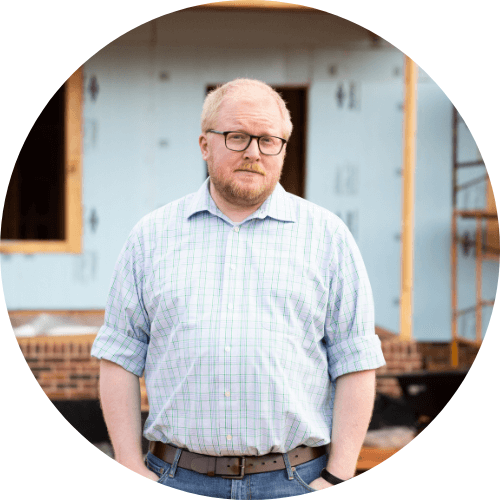
"I have worked in the nonprofit arena for many years. The idea of returning to school for my master’s degree was daunting, especially given my typical work schedule of long and varied hours. However, knowing that I could earn my master’s degree in Community Development through IDEA and that it would fit around my work and personal needs put me at ease. Multiple times throughout my coursework I have learned a theory, process, or skill one evening, gone to work the next morning, and applied what I learned the night before in my job."
Andrew Isola, community development master's degree student, and recipient of the 2023 Student Excellence Award
Program Outcomes in Community Development
Graduates of the community development programs are well-suited to enter impactful roles in government service, public policy, youth development, education, community advocacy, and healthcare services. In these industries, you will find yourself equipped to lead and make meaningful change in areas such as:
- Community and regional planning
- Economic development and entrepreneurship
- Community health and wellness
- Anti-poverty programs
- Cooperative extension
- Housing and infrastructure
- Non-profit organizations
- Parks and recreation
- Natural resource management
- Public administration
- Applied Sociology
- Tribal, immigrant, refugee, and youth programs
Hear from Sarah Farley, a community development master’s graduate from Kansas State University, about the unique collaboration between faculty and students and how it prepared her for a role as a community engagement manager.
Program Information at Participating Universities
The following member universities offer the master’s degree in community development and hold regional accreditation:
These three universities collaborate to provide an interdisciplinary curriculum covering a wide range of skill-building topics, giving you the opportunity to customize your degree experience to meet your goals and advance your career. As this Venn Diagram portrays, this program is a unique blend of expertise that you won't find in a program housed at just one university. While SDSU continues to teach in the program, they are no longer admitting new students.
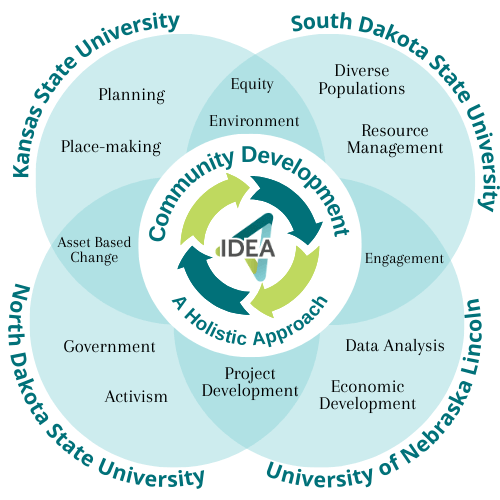
All IDEA member universities are accredited by regional agencies, aligning with requirements set by the U.S. Department of Education. This ensures that students pursuing their degrees through IDEA are met with a high standard of academic excellence, which is essential in sitting for certification exams and pursuing future employment. Learn more about the accreditation of our member universities.
Listen to April-Dawn Knudsen, a graduate of the community development program, explain how the project-based curriculum provided her the opportunity to become a changemaker in her community.
Collaborate with Expert Faculty
IDEA's community development faculty are leading scholar-practitioners in their field with extensive experience across specializations. Coming from different home universities, they blend perspectives and expertise with one another to create a uniquely engaging online academic experience.
They care deeply about your success, supporting you in your pursuit of academic, personal, and professional goals. Listen as community development professor Dane Mataic shares how the curriculum in this program can be applied directly to communities where students work and live.
The IDEA faculty helps you take applied research and theory and turn it into action, addressing structural issues in urban and rural communities of all sizes and demographic makeup. They collaborate directly with you to ensure you maximize your skillset and can in turn better, and more efficiently, help communities make continual, forward-striving progress. Learn more about how faculty and students leverage a community's assets to make change.
Transform the World Around You through a Community Development Degree
IDEA’s online community development master’s degree and graduate certificate program prepares you to be a confident, effective community leader who can navigate the increasingly complex landscape and bridge the gap between agencies and people.
Hear from Mary Emery, professor at the University of Nebraska-Lincoln, how graduates of the community development program can utilize the knowledge and skills they learn to effect positive change in their communities.
Are you passionate about social and economic justice and are ready to change the world? Apply now!
 "My peers, who live all over the country and in various places around the globe, have challenged me to develop a broader and more diverse understanding of ‘community' and how common problems affect each unique community. I’m not just learning how to address similar issues in similar locations but am learning to be creative and adapt development methods to create solutions based on each community’s unique culture and needs."
"My peers, who live all over the country and in various places around the globe, have challenged me to develop a broader and more diverse understanding of ‘community' and how common problems affect each unique community. I’m not just learning how to address similar issues in similar locations but am learning to be creative and adapt development methods to create solutions based on each community’s unique culture and needs."
Molly Roush, Community Development Graduate, Executive Director of the Albuquerque International Association
 What You Will Learn
What You Will Learn How You Will Learn
How You Will Learn




 "My peers, who live all over the country and in various places around the globe, have challenged me to develop a broader and more diverse understanding of ‘community' and how common problems affect each unique community. I’m not just learning how to address similar issues in similar locations but am learning to be creative and adapt development methods to create solutions based on each community’s unique culture and needs."
"My peers, who live all over the country and in various places around the globe, have challenged me to develop a broader and more diverse understanding of ‘community' and how common problems affect each unique community. I’m not just learning how to address similar issues in similar locations but am learning to be creative and adapt development methods to create solutions based on each community’s unique culture and needs." 
